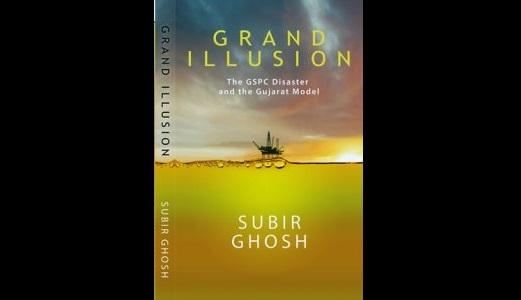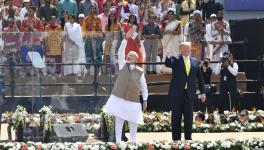Showcase of Gujarat Model: The GSPC Fraud

“Grand Illusion: The GSPC Disaster and the Gujarat Model” is a new book authored by Subir Ghosh, and published by Paranjoy Guha Thakurta. It describes how Modi, as chief minister of Gujarat, hyped up a state public sector undertaking (Gujarat State Petroleum Corp.) claiming it had discovered gas worth “100 billion dollars”, how GSPC groped in the dark trying to “find” the gas even as it was borrowing heavily and giving concessions to Adani Group and others, how “Other Expenses” in its books went up from Rs.16 crore to Rs.500 crore and ultimately how, PM Modi is now forcing ONGC to buy out GSPC. It is a distressing tale of deception, bungling and, perhaps, malfeasance, backed by CAG’s pithy observations on the subject. It is also, as the author shows, typical of what the much hyped ‘Gujarat Model’ is all about. Newsclick presents exclusive extracts from the book.
Extracts:
Hype and Hyperbole
[At a press conference addressed by chief minister Narendra Modi in Gandhinagar on 26 June 2005] came the grand announcement: the Gujarat State Petroleum Corporation (GSPC) had struck gas in the Krishna-Godavari (KG) basin off the coast of Andhra Pradesh, and the estimated outflow was 20 trillion cubic feet (tcf). A beaming Modi proclaimed that the value of the gas would be Rs 2 lakh crore ($50 billion), and it would catapult Gujarat to being ‘India’s economic superpower.’
Then came the projections. The discovery would lead to annual savings of Rs 10,000 crore in foreign currency for the next two decades, and cut down on the country’s gas deficit by 20 per cent in three years. The amount of gas that would be produced was claimed to be 75–80 million metric cubic metres (mmcum).
The Gujarat government (not the GSPC, mind you), he said, had spent Rs 250 crore so far, and would now spend an additional Rs 1,500 crore. And the money would come too. ‘Investors will now all queue up,’ he quipped. No one at the time had a clue how much the GSPC would end up borrowing.
Lie Another Day
Just as the GSPC was nearing its official exploration phase without anything to show, Modi called another press conference. The claims became taller, and more emphatic. The Times of India gushed the next day, ‘A 100 billion dollars! That’s the valuation Gujarat Chief Minister Narendra Modi declared on Thursday (17 July 2008) for the gas find by Gujarat State Petroleum Corporation (GSPC) in the Krishna-Godavari basin. An excited Modi, who rushed to the drilling platform off the Andhra coast, said the GSPC would be able to fulfil the energy requirements of Gujarat for a long time to come.’
Business on its Head
The actual average cost incurred for drilling per metre was seven times higher at $16,834 (Rs 7.65 lakh, against the estimated cost $2,254 (Rs 1.02 lakh). ‘This confirms the fact that the proper estimation of cost for the phase I was not made at the time of bidding. Though the company had no experience as operator of an offshore block, it had hastily committed to drill wells with a depth ranging from 900 metres to 4,118 meters and had finally drilled 16 wells with depths ranging from 2,535 metres to 6,007 metres (i.e., 1.46 to 2.81 times than the estimated depth).’
[T]he 2009 FDP [Field Development Plan] for the DDW area had estimated a capital cost of $2,751.04 million (Rs 13,122.46 crore), but by 31 March 2015 $3,418.45 million (Rs 17,025.45 crore including exploration costs) had already been spent.
Blind Debts
The CAG’s conclusions were clear: ‘The company did not address properly the risks associated with cost, technology and gas pricing. This has resulted in uncertainty regarding the future prospects from the KG block where an investment of around Rs 19,576 crore was made as of March 2015. The development costs incurred in the block also resulted in increased borrowings and stressed finances for the company.’
Meanwhile, the company’s total borrowings rose from Rs 7,126.67 crore in 2010–11 to Rs 19,716.27 crore by 2014–15, a rise of 177 per cent. This raised its interest costs from Rs 631.53 crore to Rs 1,804.06 crore in the same period, over 75 times its net profit.
Large write-offs of large investments are not uncommon in oil and gas (o&g) exploration activities. But, over the two in-depth reports, the Comptroller and Auditor-General (CAG) persistently noted discrepancies in several transactions between the Gujarat State Petroleum Corporation (GSPC) and other companies leading to losses to the public exchequer or the passing of undue financial benefits to private companies.
Looking for Oil Dorado
[Jairam] Ramesh’s Financial Express rejoinder had concluded:
It is clearly not a simple case of a business decision going awry. It is abundantly clear from the series of incidents that a state owned company was exploited by the Gujarat state government in the garb of adventurous gas exploration to borrow money recklessly through public sector banks and squandered away. Instead of feeble attempts to defend the indefensible, the nation would be better served with an independent inquiry into the missing trail of `20,000 crore of Indian savers’ money.
In November 2016, Congressman Jairam Ramesh linked the demonetisation drive of the Union government launched on 8 November 2016, the Reserve Bank of India (RBI) and the GSPC:
Urjit Patel was appointed as the governor of the RBI last September by the Narendra Modi government. Urjit Patel was also an independent director and the chairman of the audit committee of the Gujarat State Petroleum Corporation (GSPC) from FY’06 to FY’13. Narendra Modi was the chief minister of Gujarat in this period. [The] GSPC is a Gujarat state public sector company, under the ministry of petrochemicals and energy. The minister was Saurabh Dalal Patel. During this time [the] GSPC’s loans from banks ballooned from `270 crore to `14,000 crore.
[Jairam Ramesh] then touched upon something that had not been dealt with in either of the CAG reports:
If there was no gas to be found, then what was all this borrowed money used for? Typically when businesses borrow for new projects or expansion, they tend to hire more workers, build more factories, etc. However, GSPC’s wage bill was constant in this time period, indicating that the company did not hire more employees. However, a category called ‘other expenses’ saw a jump from `16 crore in 2006 to `500 crore in 2013. What these ‘other expenses’ entailed is perhaps best left to one’s imagination.
The Comptroller and Auditor-General of India (CAG) has issued a scathing report on the borrowings of [the] GSPC, which has all been squandered away. [The] GSPC had a joint venture with another company Gujarat Natural Resources Ltd (GNRL) for many of its oil and gas blocks. [The] GNRL, contrary to its misleading name, is a private limited company and not a state enterprise. Saurabh Patel, the minister overseeing GSPC, is a beneficiary investor in GNRL. This has been revealed by the Indian Express in its investigative report on 22 November 2016. Urjit Patel, as an independent director and chair of the audit committee of [the] GSPC, not only approved [the] GSPC’s excessive borrowings from banks that he now oversees as RBI governor, but also failed to highlight this obvious conflicted related party relationship between the minister and [the] GSPC. Saurabh Patel was a close confidante of Narendra Modi.
Another Fraud on the Country
Once Narendra Modi had ascended to the position of prime minister in May 2014, the financial misadventures and cavalier way of running business at the Gujarat State Petroleum Corporation (GSPC) could no longer be kept away from the glare of the public. But spin doctors working overtime over how big the deal would be, that was where the focal point remained. What was astonishing was the manner in which the Oil and Natural Gas Corporation (ONGC) was made to bail out a bleeding entity. Reports of conflict of interest, arm-twisting and financial skulduggery kept appearing in the media, but to no avail.
Get the latest reports & analysis with people's perspective on Protests, movements & deep analytical videos, discussions of the current affairs in your Telegram app. Subscribe to NewsClick's Telegram channel & get Real-Time updates on stories, as they get published on our website.
























